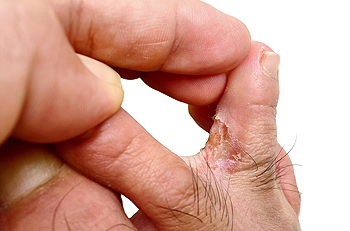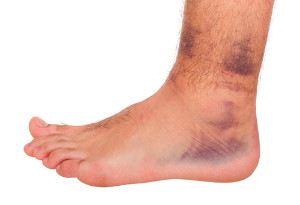Connect With Us
Blog
How Can You Tell If Athlete’s Foot Has Developed
There are clear signs that can indicate whether athlete's foot has developed or not. A common symptom related to this condition is the formation of a red rash that may spread all over the afflicted foot and is normally found in between the toes. If left untreated, the rash may spread underneath the foot, leaving the skin looking scaly or chalky. Additionally, the rash may be incredibly itchy, however, scratching the affected area may cause more harm to the skin, which is why it is advised that scratching be refrained. Athlete’s foot is a fungal skin infection that may enter the skin if footwear is not worn in warm, moist environments. Areas where this infection typically spreads can include communal showers, locker rooms, and swimming pools. For advice on how to treat your athlete’s foot or for tips on prevention, we recommend you consult with a podiatrist for professional care.
Athlete’s foot is an inconvenient condition that can be easily reduced with the proper treatment. If you have any concerns about your feet and ankles, contact one of our podiatrists from Foot & Ankle Associates of Maine. Our doctors will treat your foot and ankle needs.
Athlete’s Foot: The Sole Story
Athlete's foot, also known as tinea pedis, can be an extremely contagious foot infection. It is commonly contracted in public changing areas and bathrooms, dormitory style living quarters, around locker rooms and public swimming pools, or anywhere your feet often come into contact with other people.
Solutions to Combat Athlete’s Foot
- Hydrate your feet by using lotion
- Exfoliate
- Buff off nails
- Use of anti-fungal products
- Examine your feet and visit your doctor if any suspicious blisters or cuts develop
Athlete’s foot can cause many irritating symptoms such as dry and flaking skin, itching, and redness. Some more severe symptoms can include bleeding and cracked skin, intense itching and burning, and even pain when walking. In the worst cases, Athlete’s foot can cause blistering as well. Speak to your podiatrist for a better understanding of the different causes of Athlete’s foot, as well as help in determining which treatment options are best for you.
If you have any questions please feel free to contact our office located in Brunswick, ME . We offer the newest diagnostic and treatment technologies for all your foot and ankle needs.
How To Find Relief From Cracked Heels
 There are several reasons why the condition, known as cracked heels, may develop. These can include wearing shoes that have an open back, living in a dry environment, and standing for extended periods of time throughout the day. Common symptoms of this ailment can include dry skin on the heel and surrounding areas, and in severe cases, the skin may split open which is referred to as fissures. Mild relief may be found when the feet are washed in warm water, followed by using a good ointment. This may be effective in replenishing moisture that is necessary in maintaining soft skin. If you would like more information about the causes and treatment of cracked heels, please consult with a podiatrist.
There are several reasons why the condition, known as cracked heels, may develop. These can include wearing shoes that have an open back, living in a dry environment, and standing for extended periods of time throughout the day. Common symptoms of this ailment can include dry skin on the heel and surrounding areas, and in severe cases, the skin may split open which is referred to as fissures. Mild relief may be found when the feet are washed in warm water, followed by using a good ointment. This may be effective in replenishing moisture that is necessary in maintaining soft skin. If you would like more information about the causes and treatment of cracked heels, please consult with a podiatrist.
If the skin on your feet starts to crack, you may want to see a podiatrist to find treatment. If you have any concerns, contact one of our podiatrists from Foot & Ankle Associates of Maine. Our doctors can provide the care you need to keep you pain-free and on your feet.
Cracked Heels
It is important to moisturize your cracked heels in order to prevent pain, bleeding, and infection. The reason cracked heels form is because the skin on the foot is too dry to support the immense pressure placed on them. When the foot expands, the dry skin on the foot begins to split.
Ways to Help Heal Them
- Invest in a good foot cream
- Try Using Petroleum Jelly
- Ease up on Soaps
- Drink Plenty of Water
Ways to Prevent Cracked Heels
- Moisturize After Showering
- Skip a Shower
- Keep Shower Water Lukewarm
- Don’t Scrub Your Feet
If you are unsure how to proceed in treating cracked heels, seek guidance from a podiatrist. Your doctor will help you with any questions or information you may need.
If you have any questions, please feel free to contact our office located in Brunswick, ME . We offer the newest diagnostic and treatment technologies for all your foot care needs.
Swollen Feet During Pregnancy
 Foot conditions are generally a common ailment among pregnant women. The weight from increased blood volume, as well as the growing fetus, may cause the feet to become flat, which can produce sharp or aching pains. Moderate relief may be found when shoes that are worn fit properly. To ensure a perfect fit and for extra support, it may help to wear custom-made orthotics. Additionally, swollen feet and ankles are a common ailment among pregnant patients, and can be uncomfortable. It is beneficial to elevate the feet frequently during the day, as this may help to reduce existing swelling. Some pregnant women experience ingrown toenails, which may be a result of changes in the size and shape of the toenail. If you would like more information about how your feet may be affected during pregnancy, it is recommended that you consult with a podiatrist.
Foot conditions are generally a common ailment among pregnant women. The weight from increased blood volume, as well as the growing fetus, may cause the feet to become flat, which can produce sharp or aching pains. Moderate relief may be found when shoes that are worn fit properly. To ensure a perfect fit and for extra support, it may help to wear custom-made orthotics. Additionally, swollen feet and ankles are a common ailment among pregnant patients, and can be uncomfortable. It is beneficial to elevate the feet frequently during the day, as this may help to reduce existing swelling. Some pregnant women experience ingrown toenails, which may be a result of changes in the size and shape of the toenail. If you would like more information about how your feet may be affected during pregnancy, it is recommended that you consult with a podiatrist.
Pregnant women with swollen feet can be treated with a variety of different methods that are readily available. For more information about other cures for swollen feet during pregnancy, consult with one of our podiatrists from Foot & Ankle Associates of Maine. Our doctors will attend to all of your foot and ankle needs.
What Foot Problems Can Arise During Pregnancy?
One problem that can occur is overpronation, which occurs when the arch of the foot flattens and tends to roll inward. This can cause pain and discomfort in your heels while you’re walking or even just standing up, trying to support your baby.
Another problem is edema, or swelling in the extremities. This often affects the feet during pregnancy but tends to occur in the later stages.
How Can I Keep My Feet Healthy During Pregnancy?
- Wearing orthotics can provide extra support for the feet and help distribute weight evenly
- Minimize the amount of time spent walking barefoot
- Wear shoes with good arch support
- Wear shoes that allow for good circulation to the feet
- Elevate feet if you experience swelling
- Massage your feet
- Get regular, light exercise, such as walking, to promote blood circulation to the feet
If you have any questions please feel free to contact our office located in Brunswick, ME . We offer the newest diagnostic and treatment technologies for all your foot and ankle needs.
How Do Ankle Sprains Occur?
A common injury that is known as an ankle sprain can occur as a result of suddenly twisting the ankle. The ligaments in the ankle can become stretched beyond normal limitations, and can happen from participating in sporting activities, or from stepping on uneven pavement. This type of injury often produces severe pain and discomfort, and can inhibit the ability to walk. Additional symptoms can include swelling and bruising surrounding the affected area, and it may be difficult to bend the ankle. After a proper diagnosis is performed, which often consists of having an X-ray taken, the correct treatment can begin. If you have sprained your ankle, it is strongly suggested that you consult with a podiatrist who can guide you toward the correct treatment techniques.
Ankle sprains are common but need immediate attention. If you need your feet checked, contact one of our podiatrists from Foot & Ankle Associates of Maine. Our doctors can provide the care you need to keep you pain-free and on your feet.
How Does an Ankle Sprain Occur?
Ankle sprains take place when the ligaments in your ankle are torn or stretched beyond their limits. There are multiple ways that the ankle can become injured, including twisting or rolling over onto your ankle, putting undue stress on it, or causing trauma to the ankle itself.
What Are the Symptoms?
- Mild to moderate bruising
- Limited mobility
- Swelling
- Discoloration of the skin (depending on severity)
Preventing a Sprain
- Wearing appropriate shoes for the occasion
- Stretching before exercises and sports
- Knowing your limits
Treatment of a Sprain
Treatment of a sprain depends on the severity. Many times, people are told to rest and remain off their feet completely, while others are given an air cast. If the sprain is very severe, surgery may be required.
If you have suffered an ankle sprain previously, you may want to consider additional support such as a brace and regular exercises to strengthen the ankle.
If you have any questions please feel free to contact our office located in Brunswick, ME . We offer the newest diagnostic and treatment technologies for all your foot and ankle needs.


